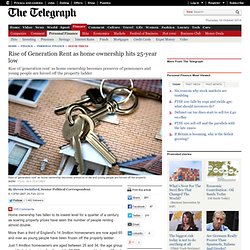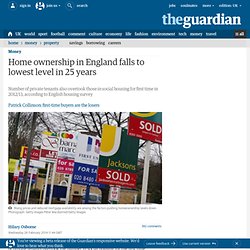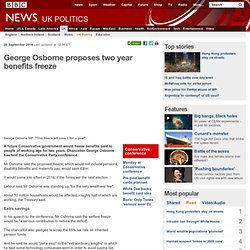

Rise of Generation Rent as home ownership hits 25-year low. By contrast, the number of people living in private rented accommodation has risen from 2.2million in 2002/03 to nearly 3.9million last year.

The number of people renting from private landlords now outstrips those in council and housing association homes for the first time. Half of those renting privately are under the age of 34, with private rentals outstripping social housing for the first time. The figures also disclose that there has been a significant increase in the number of people who rent their homes claiming housing benefit. Over the past five years, the proportion of people claiming benefits who rent privately has risen from 19 per cent to 25 per cent, while in the social housing sector the figure has risen from 59 per cent to 66 per cent. The Department for Communities and Local Government said that the rise of private rentals had been influenced by rise in buy-to let mortgages.
"We need to build many more homes to keep up with demand. Home ownership in England falls to lowest level in 25 years. Home ownership fell to its lowest level in 25 years in 2012/13, while the number of private tenants overtook the number in social housing for the first time, according to official figures that show how tenure has shifted over three decades.

The latest English housing survey showed that the proportion of homes lived in by owner-ocupiers had dropped to 65.2%, down from 71% in 2003 and its lowest level since 1987. Ownership levels have been driven down by rising prices and tougher mortgage criteria, and charities have called on the government to increase the number of affordable homes being built. Campbell Robb, Shelter's chief executive, said: "These figures confirm the historic shift that people across the country are already feeling. As house prices rise, the dream of a stable home is drifting further out of reach.
The survey showed that 3.9m of the country's 22m households were living in private rented homes in 2012/13, compared with 3.7m social renters. Young & Jobless. House prices accelerated in August, says Land Registry. 26 September 2014Last updated at 09:01 ET The rate of change varies significantly in different parts of the country Annual house price growth accelerated to 8.4% in England and Wales in August - the highest rate of increase for nearly seven years, figures show.

The Land Registry said prices were up by 1% compared with July, with increases again driven by London. The figures do not reflect some commentators' views of a housing market starting to cool. But some areas, including Windsor and Maidenhead and South Yorkshire, have seen month-on-month falls. Nsumers face 'lost decade' as spending squeeze bites. 29 September 2014Last updated at 02:55 ET Households in the "squeezed middle" will have little disposable income over the next few years, the EY Item Club report suggests British consumers face another three years of squeezed spending, an influential report suggests, amounting to a "lost decade" for households.

Annual wage growth is likely to remain well below the 4.5%-to-5% rises seen before the financial crisis struck in 2008, the EY Item Club survey says. This will slow consumer spending growth over the next two years. Median pay in real-terms is forecast to fall from £18,852 in 2008 to £17,827 by 2017, the survey suggests. The Item club, a non-governmental forecaster that uses HM Treasury's model of the UK economy, believes that record numbers of people in work - currently 30.6 million - will act as a brake on wage rises.
UK manufacturers 'want to stay in EU', poll finds. 28 September 2014Last updated at 19:51 ET Both UK and EU manufacturers have been suffering in recent months.

Britain's manufacturers are overwhelmingly in favour of the country remaining a part of the European Union, a survey suggests. The manufacturers' organisation EEF found that 85% of those it polled would vote to stay in the EU, and only 7% would opt to leave, despite the bloc's economic troubles. Firms with more than 250 employees were most keen on the EU, with 90% saying they would want to retain membership. EEF represents over 6,000 companies. The survey, carried out in August, included 160 companies. George Osborne proposes two year benefits freeze. 29 September 2014Last updated at 12:38 ET <div class="warning"><img class="holding" src=" alt="George Osborne MP" /><p><strong>Please turn on JavaScript.

</strong> Media requires JavaScript to play. </p></div> George Osborne MP: "This freeze will save £3bn a year" A future Conservative government would freeze benefits paid to people of working age for two years, Chancellor George Osborne has told the Conservative Party conference. Mr Osborne said the proposed freeze, which would not include pensions, disability benefits and maternity pay, would save £3bn. It would come into effect in 2016, if the Tories win the next election.